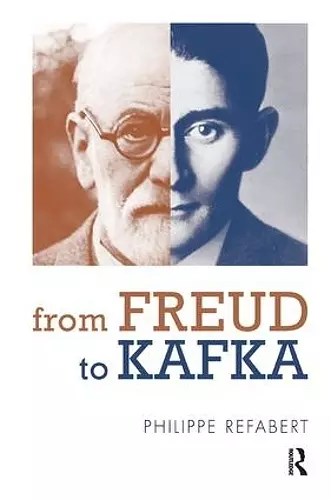From Freud To Kafka
The Paradoxical Foundation of the Life-and-Death Instinct
Format:Paperback
Publisher:Taylor & Francis Ltd
Published:31st May '14
Currently unavailable, and unfortunately no date known when it will be back
This paperback is available in another edition too:
- Hardback£135.00(9780367102685)

This book takes the reader on a captivating journey leading from an erroneous founding assumption inherited from Freud, to the proposal of a principle better suited to allowing the psychoanalyst to accompany the patient out of his impasse. The founding assumption of the book, already questioned by many analysts among whom Sandor Ferenczi figures as a brilliant forerunner, was the author's starting point in re-examining the basic precepts of psychoanalysis.Reading Kafka made the author conclude that this masterful storyteller describes borderline situations, so familiar to him, better than anyone. An avid reader of Freud, Kafka suggests that the human capacity to bear a paradoxical position between life and death is not given to the child naturally, at birth. Kafka seems to say that giving life is easy, but that giving it the necessary support in the form of the trace of death is more problematic. Moreover, when the child is deprived of this trace, he faces the void and, in a panic, must use emergency measures to construct a substitute for the necessary trace of death; and he can only do so by sacrificing his sexuality, his ability to feel, his initiative or his judgement. When the conditions necessary for primal repression are not provided to the child by others, he creates them himself at great cost. What he gives himself is not life, but life-death, and he pays the price for doing so. When primal repression is destroyed - something which can happen at any age - we speak of "soul murder". At the very instant when it occurs, a new Subject comes into existence, a Subject who pushes back the threat of destruction. The new Subject constructs otherness out of an object or out of a part of himself, a part he sacrifices in order to recover the primal repression destroyed by the trauma.This book will interest not only psychotherapists, psychoanalysts, philosophers and students of literature, but also a wide range of readers with a passion for the complexities of the human soul.
'What a pleasure to be guided through the chaos of our daily meanderings by the firm footsteps of Philippe Refabert, whose clinical experience throws its fascinating light on Kafka's short stories. The tools he places at our disposal go beyond those granted to us by Freud, while reaffirming the latter's conviction that there is more psychoanalysis in works of literature than in theoretical treatises.'-Francoise Davoine, psychoanalyst; professor at the Ecole des Hautes Etudes en Sciences Sociales, Paris; and co-author of History Beyond Trauma'I find this book fascinating. Its serious questioning of Freud introduces an innovative perspective on an essential matter and provides a perspective both convincing and brilliant on Kafka and the origin of literature. Kafka crossing the Freudian line of closure is an immensely fertile idea.'- Philippe Lacoue-Labarthe, philosopher, literary critic, and translator'This book is a rare event: truly good news for budding psychoanalysts and for many other people. I am thinking particularly of all those kept alive, but captive, by "catastrophic healing". The author dares to say out loud about homosexuality what our culture strives to prevent from being even faintly glimpsed. He has the courage to propose a radically new perspective: he dares to say that there is no third sex, but only people who have been evicted from their "bodies".' - Marie Balmary, psychoanalyst and author'Philippe Refabert confronts Freudian theory with his trauma-related clinical experience. He observes that, at times, trauma is the result of the insidious "soul murder" committed by the parental couple with respect to the child. Refabert reminds us that in the sphere of pain, the psychoanalyst's work is akin to the poet's constant receptivity to astonishment. For therapists, this book is a work of reference; for all of us, it is a joy to read.'- Heitor O'Dwyer de Macedo, psychoanalyst and author of De l'amour a la pensee
ISBN: 9781782201298
Dimensions: unknown
Weight: unknown
144 pages